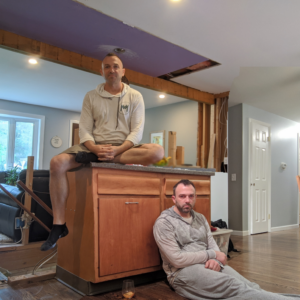Divorce and the Mediation Process: The Male Lens of a Former Client and How He is Paying it Forward
By Jeffrey Hoffman
The divorce process felt like when a gladiator walks into a coliseum, or at least what I imagine that would feel like: The muted roar from the crowd warns of something large and looming, but you don’t know if they are cheering for or against you. Your family, your friends, and your colleagues are sitting in the stands, but so are her family, her friends, and her colleagues. I felt powerful – like I was impacting my own future. After all, I chose to be here and at the same time, I felt woefully unprepared for a potential battle I’ve only previously witnessed from the stands.
Walking into The Mediation Center was the first time I would have to negotiate for my own interests in the contexts of the marriage and its dissolution. We chose mediation because 1) We understood that it could be less expensive than traditional litigation through attorneys, 2) We felt we had sufficient strength in conviction to do what’s best for the family, despite our differences, and 3) We heard of others who had done mediation successfully and recommended The Mediation Center. We both arrived at the office around the same time, hugged, and were cordial as we were introduced to the process.
Renee LaPoint introduced herself to us and my first reactions were comfort and fear. Renee is friendly, crisply professional, and balanced. She is also a woman. Because of this, I worried it would be “two against one,” with her siding with my wife, and that I would need more advocacy for equal footing in the discussion. This was not the case at all. During the entire mediation process, I felt no bias towards or against me because of my gender. Although my experience when discussing divorces has been that men need to advocate more heavily to be seen as equal partners in the divorce, this wasn’t the case with Renee.
A friend described divorce by saying it’s like being on a roller coaster except the peaks and valleys are compressed. This played out fairly accurately for me. I could be in the middle of a work meeting with my chest tight and tears forming in my eyes from the terror filled thoughts of potentially fracturing the relationship with my kids – but still needing to present slides to colleagues. I would be buzzed and belly-laughing with new friends, but end the night alone in my empty, sterile apartment wondering if my kids blamed me. I would have new, deeper connections with my kids, but crumble into a depressed – sometimes suicidal – drunken mess after dropping them off at their mother’s house on designated days (and alternate weekends). I would leave The Mediation Center and cry in a park before returning to work. Divorce removed the ill-fitting armor of normalcy and forced me to bootstrap a new way of living for myself.
Divorce forced me to identify and prioritize my needs; it forced me to decide with intent where my energy was best spent, and it shoved me into a battle with my own demons that I had to face if I was going to make it through the process. And I did.
The expression “getting divorced sucks – but being divorced is great,” rang true for me. I went from feeling like an invisible foundation to a structure larger than myself, to being a craftsman of my own destiny. New found control. Discovering myself and the work that needed to be done on this newest part of my journey.
During my divorce process, I was grateful to the community that surrounded my wife so that she could be supported and bolstered as she went through this huge life change. But I received no such outpouring. I wondered if I was the only man who felt this way, SO…
I created VISIBLE MAN, www.visibleman.org – an organization that connects men in need, trains men to become better men for themselves and others, and is a visible network of advocates for men’s mental health and suicide prevention.
The Mediation Center gave us a framework for the difficult discussions and negotiations that need to happen for divorce, and provided a safe, unbiased environment to have them. The process exposed me to things I had never experienced, and helped me craft a new, battle-scarred but stronger, smarter version of myself.
Find out how you can connect with other men going through the same experience, and help us to become seen. You can find me at www.VisibleMan.org, on Facebook, Instagram, Twitter, or at [email protected].

